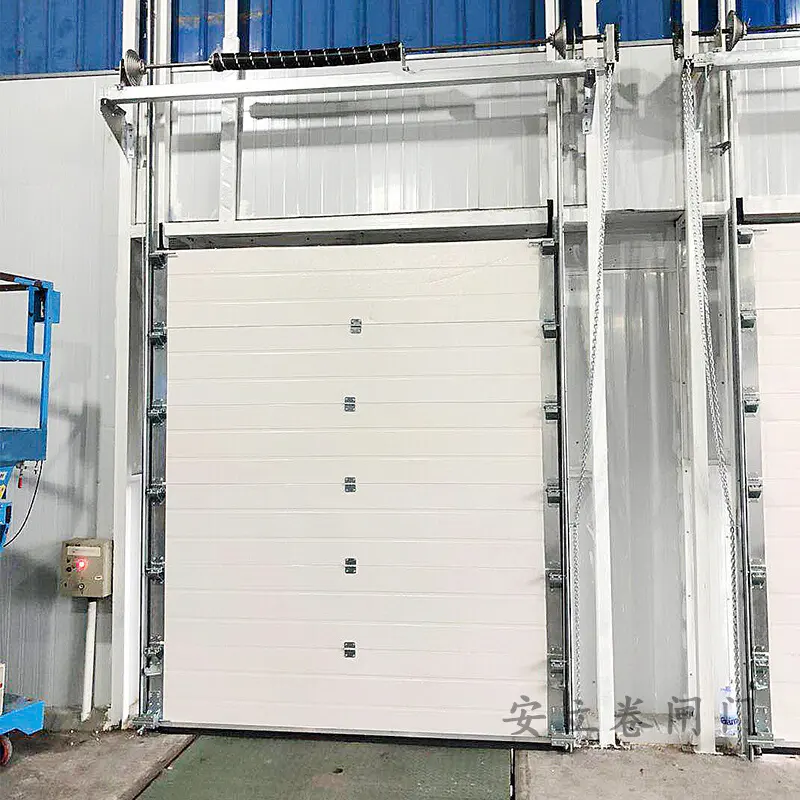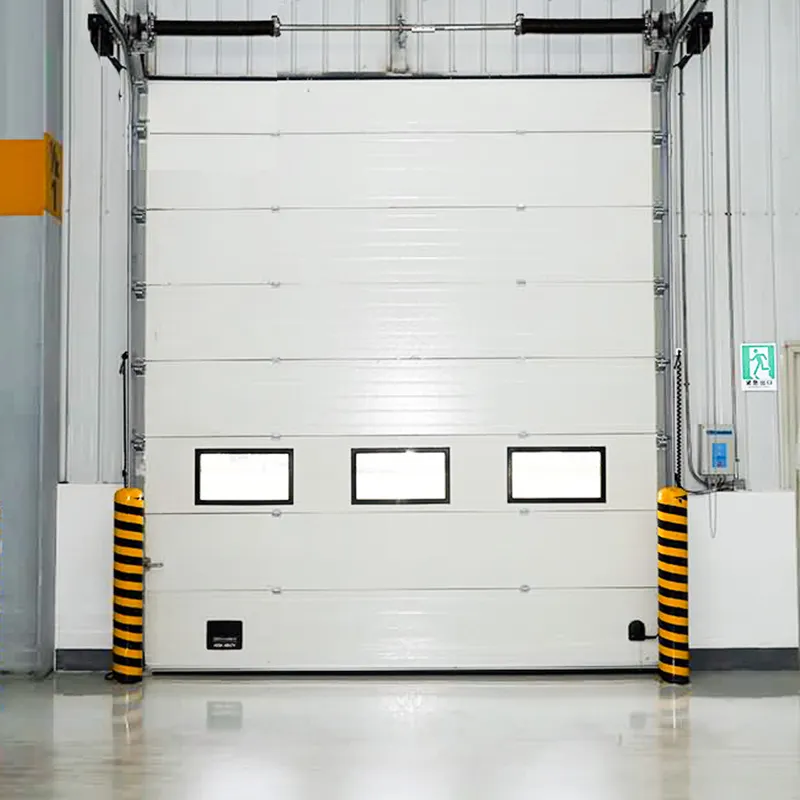Understanding Sectional Garage Doors
Basic Design and Operation
Sectional garage doors are made up of multiple panels connected by hinges, allowing them to open straight up instead of taking up floor space. This makes them great for those narrow driveways where every inch counts. What's really nice about this setup is how it frees up all that headroom inside the garage while getting rid of the annoying swing out movement we see on older door models. For folks living in neighborhoods where driveway space is at a premium, this means no more fighting with cars parked too close. How do these doors actually work? Well behind the scenes there's usually some sort of spring system combined with cables that make everything run smoothly when opening or closing the door.
- Springs work to counterbalance the door's weight, making it easy to lift and avoid sudden drops.
- Cables run along tracks and ensure smooth, controlled movement.
Sectional garage doors work great with electric openers too, which adds real convenience factor. The opener systems definitely cut down on the time people spend manually operating their doors, especially when it's freezing cold outside or pouring rain. Just hit a button and the door opens up automatically. Homeowners love these doors because they take up less space than traditional models while still getting the job done right. Plus, nobody wants to struggle with a stuck door during a snowstorm, so having that remote control option becomes pretty important over time.
Sectional vs. Roll-Up Garage Doors
Space Requirements Compared
Looking at sectional versus roll-up garage doors shows they have very different space needs. Sectional models require extra room above since their panels slide along tracks until the whole door lies flat against the ceiling when opened. Roll-up doors work differently though. They stack together in one compact cylinder right above the opening, so they don't take up much vertical space at all. That's why these types are often seen in city garages or anywhere else where there just isn't enough headroom. Homeowners dealing with tight spaces find this real advantage because it lets them maximize every inch without having to worry about clearance issues later on.
Security and Durability Differences
Looking at sectional versus roll-up doors shows some real differences when it comes to security and how long they last. Most people find that sectional garage doors come with better insulation properties and much stronger locking systems, which makes them harder to break into. These doors are typically built from heavier gauge steel or composite materials that just don't wear out as fast and stand up pretty well against accidental bumps or deliberate attacks. Roll-up doors tend to hold up okay too, but they do have a reputation for getting damaged easier when something hits them hard. They also don't insulate nearly as well as sectionals. So what should someone look for? If keeping heat in during winter months matters or there's concern about unauthorized entry, then sectional doors make sense despite costing more upfront. For smaller spaces where simplicity counts more than everything else, roll-ups still work great for many applications. The bottom line remains picking based on actual needs rather than going with whatever looks good in catalogs.

Sectional vs. Swing-Out Garage Doors
Weather Resistance Comparison
Sectional garage doors really stand out when we talk about keeping out bad weather thanks to how they're built in layers, something regular swing-out doors just can't match. These doors come with special weather stripping that does wonders at stopping warm air from escaping and cold drafts from sneaking in. Regular swing-out models tend to develop those annoying little gaps over time, letting in all sorts of unwanted stuff like wind and dampness. Homeowners who care about saving money on utility bills will find this particularly interesting. The right insulation makes these sectional doors slash heating and cooling expenses quite dramatically, which explains why so many people are switching to them nowadays for both comfort and wallet reasons.
Space Utilization Challenges
How much space we have available makes a big difference when picking between sectional and swing out garage doors. Swing out models need quite a bit of room right outside the garage to work properly, something that becomes a real headache on narrow driveways or in neighborhoods where every inch counts. Sectional doors tell a different story altogether since they don't rely on driveway clearance at all. That's why they're so popular among folks living in smaller properties or apartments with attached garages. Homeowners love how these doors let them squeeze in an extra car or two without sacrificing storage space. And let's not forget about local building rules either. Many cities actually restrict installing swing out doors because of safety concerns or street width limitations, which explains why sectional designs dominate in urban settings across the country.
Sectional vs. Sliding Garage Doors
Track Systems and Installation
Sectional garage doors bring some special headaches when it comes to track systems and installation work. The way these doors operate involves rolling panels up into the ceiling along a complicated track system, something that often needs serious thought before starting, particularly if there are things hanging from the ceiling or pipes running across the area. Sliding doors tell a different story altogether. These need a completely unobstructed straight line for them to move side to side, which pretty much rules out certain spots for installation. Because of all this complexity, getting advice from someone who actually installs these things regularly makes a lot of sense. A good installer will look at how the garage is built, check for any weird angles or tight corners, and then suggest either option depending on what fits best with the available space and how the garage is laid out.
Weather-Sealing Capabilities
When it comes to keeping bad weather out, sectional garage doors generally perform better. These doors feature improved seals around all the joints, so they block drafts and stop water from getting inside. That means cars and other stuff stored in the garage stay drier and cleaner during storms or heavy rain. Sliding doors tell a different story though. Their sides are often left open, letting cold air sneak in when temperatures drop and allowing dampness to creep through after thunderstorms. Homeowners really need to check what kind of protection each door offers against local weather patterns. Knowing these details helps pick the right door for whatever kind of climate someone lives in, whether its freezing winters or humid summers.
Sectional vs. Bifold Garage Doors
Folding Mechanism Differences
The way garage doors fold makes a real difference in how easy they are to use day to day. Bifold doors split down the middle when opened, but this often takes up valuable driveway room and can be pretty inconvenient for people getting in and out. Sectional doors work differently though. They lift straight up into the ceiling space in segments, so there's much less disruption to the driveway area. This design actually saves a lot of space that would otherwise go unused. Anyone looking at garage door options should take time to look closely at how each system works mechanically. Understanding these differences helps determine what will fit best with the actual layout and daily usage requirements of a particular home or business.
Noise Reduction Properties
For most homeowners looking at garage doors, how much noise they make matters quite a bit. Sectional doors tend to run much quieter compared to those old bifold models that can get pretty loud when opening or closing. The reason? Insulation inside the panels helps soak up sounds so neighbors aren't disturbed late at night. People who have lived near busy streets or have kids running around all day find this makes a world of difference. Various home improvement magazines and online forums keep pointing out just how silent these sectional doors really are, making them a smart pick for anyone concerned about unwanted noise levels in their house.
Performance Comparison Factors
Energy Efficiency Ratings
Many people choose sectional garage doors because they tend to save more energy. The layered construction works really well at keeping heat inside during winter months. Homeowners looking to cut down on electricity expenses should definitely check out Energy Star ratings before buying a new garage door. Research shows that going with insulated models makes a real difference in how much money gets spent on heating and cooling. The ratings system helps folks pick doors that actually perform better in terms of energy conservation. Investing in one of these doors brings comfort improvements while also cutting down those monthly utility bills quite a bit over time.
Maintenance Requirements
Sectional garage doors generally don't need much work to keep running smoothly, which explains why so many homeowners go for them. With regular checks and basic maintenance, these doors can last for years. Bifold and sliding models tend to be trickier beasts though, needing more hands-on care because of all their moving parts. Most contractors we've spoken to will tell anyone who'll listen that sectional doors just need fewer visits from repair techs over time. When folks compare different garage door options, how easy they are to fix and maintain usually plays a big role in their decision. Saves headaches later when something goes wrong.
Making the Right Garage Door Choice
Space and Height Considerations
When picking out a garage door, measuring the available space and checking the height in the garage area matters a lot. Getting this right affects what kind of door will actually fit, as different door styles need different amounts of room. Sectional garage doors tend to work best when there isn't much headroom since they lift straight up against the ceiling and don't need much extra space above them. Other options such as swing out or bifold doors usually require more room around them though. Don't forget about local regulations either, as some areas have rules about how big or small a garage door can be. Taking all these things into account helps avoid headaches later on when trying to install something that just won't fit properly in the existing space.
Climate Impact on Selection
Climate matters a lot when picking out a garage door since different models come with various insulation properties and weather protection capabilities. Areas that face severe weather typically benefit from insulated garage doors, especially the sectional varieties. Such doors boost energy savings while keeping garages safe from temperature extremes both hot and cold. Talking to someone familiar with local weather patterns makes sense for anyone serious about getting the job done right. Local professionals know what works best where and can point folks toward garage door solutions that stand up well against whatever Mother Nature throws their way all year round.
FAQ
What are the main advantages of sectional garage doors over traditional doors?
Sectional garage doors offer vertical opening, minimal space usage, and eliminate swing-out motion, making them ideal for tight driveways and maximizing overhead space.
How do sectional garage doors enhance energy efficiency?
Their multi-layer and weather-seal designs provide efficient insulation, reducing energy loss and helping cut heating and cooling costs.
Can I automate my sectional garage doors?
Yes, many sectional doors can be fitted with electric openers for automated, convenient access.
Are sectional or roll-up doors better for urban homes?
Roll-up doors need less overhead space, making them suitable for low ceiling garages, while sectional doors offer better insulation and security.
What type of maintenance is required for sectional garage doors?
Regular maintenance like lubrication and track cleaning is straightforward and helps prolong the life of sectional garage doors compared to other types.

